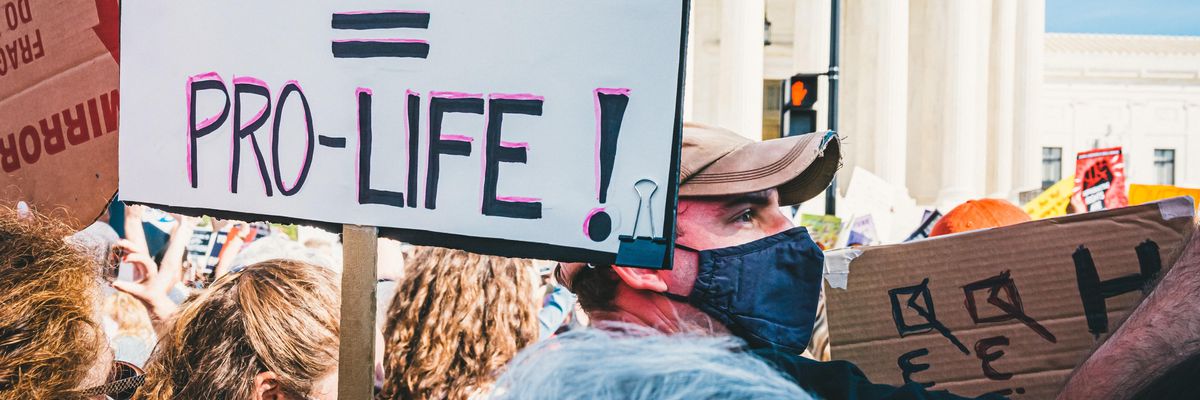Conservative Wing of Supreme Court Overturns Roe v. Wade

50 years of precedent protecting the constitutional right to abortion is put to an end.
Safe + Legal Abortion = Pro-Life
This news comes after a leaked document made its way through the news cycle just this past May which showcased the SCOTUS’ potential to overturn the case, spurring the fear of abortion rights being lost entirely or heavily restricted in many states across the country.
Roe v. Wade was passed on January 22nd, 1973, in a 7-2 decision by the Court. The ruling upheld the right to abortion within the first two trimesters of pregnancy. The case took place after “Jane Roe” (later identified as Norma McCorvey) didn’t have the means to travel outside of her native Texas to get an abortion. This led to her suing the state for the right to have access to safe, legal abortion.
Roe v. Wade has been challenged a number of times throughout the years, primarily by “pro-life” activist groups that maintain the narrative that abortion is neither healthcare nor a right. This ruling has already enabled “triggered laws” heavily restricting or banning abortion that have already passed in 13 states, with other states preparing for similar rulings to take place.
Conservative Republicans celebrated the reversal of the ruling via social media:
\u201cBREAKING: The Supreme Court correctly overturns Roe v. Wade & reinstates the right of states to protect innocent, unborn children.\n\nTexas is a pro-life state.\n\nWe will ALWAYS fight to save every child from the ravages of abortion.\u201d— Greg Abbott (@Greg Abbott) 1656081512
\u201cThe Supreme Court has returned the power to regulate abortion to the states\n\nNow we need a pro-life plan for post-Roe America\n\nHere is my proposal to support mothers & their children not just before birth but also after\n https://t.co/x2AFH116g9\u201d— Marco Rubio (@Marco Rubio) 1656081947
While prominent Democrats shared their opinions:
\u201cThe reversal of Roe will be recorded in the history books in the same nauseous tones as decisions like Dred Scott, Korematsu, Plessy, and Buck.\n\nThis is an institution that has legitimized slavery, concentration camps, and eugenics.\n\nThis decision is the same.\u201d— Ilhan Omar (@Ilhan Omar) 1656084070
\u201cAs a single mom, I know how big a decision it is to start or grow a family.\n\nToday\u2019s ruling takes that decision away from parents and gives it to politicians.\u201d— Rep. Katie Porter (@Rep. Katie Porter) 1656082099
And the internet as a whole reacted:
\u201cProbably the fastest rightward shift in my life and it\u2019s happening while democrats control the house, senate, and presidency\u201d— Mac (@Mac) 1656081390
\u201cDemocrats hold the House, Senate & White House.\n\nAct.\u201d— Nina Turner (@Nina Turner) 1656081150
\u201cRoe v. Wade is not just an abortion case. It's a privacy case. This is bad for more reasons than the media has been highlighting. How exactly do state governments intend to find out you got an abortion? How will they know you were pregnant in the first place?\u201d— Shi (@Shi) 1656080834
Speaker of the House Nancy Pelosi previously promised to pass legislation codifying Roe, making it protected under law.
The general consensus seems to indicate that there may be higher stakes at risk with the reversal of Roe, including additional concerns for other rulings to be overturned by the conservative-majority court are also being present:
\u201cClarence Thomas writes, in a concurring opinion, that the Supreme Court should reconsider Griswold, Lawrence, and Obergefell \u2014 the rulings that now protect contraception, same-sex relationships, and same-sex marriage.\u201d— Kyle Griffin (@Kyle Griffin) 1656080430
The Due Process Clause of the Fourteenth Amendment was previously cited as the main reason Roe v. Wade protected abortion rights, and, as evidenced by Justice Clarence Thomas’ comments where he opined “any substantive due process decision is 'demonstrably erroneous,” it doesn’t seem that due process will work anymore to protect these rights as well. Thomas has also gone on record after the ruling to state that previous due process precedents such as Obergefell (gay marriage), Lawrence (access to contraceptives), and Griswold (marital privacy) should all be reconsidered.
President Biden delivered his remarks on the ruling at 12:30pm EST today.
This story is evolving and the impact isn't fully known. Check back for more.




